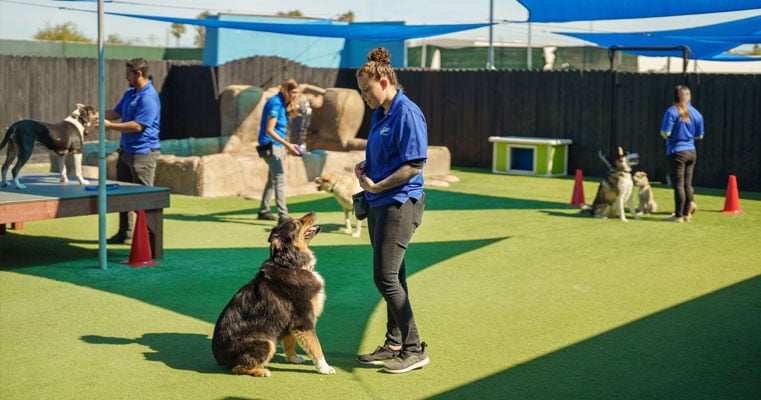The Advantages of Selecting Dog Training Near Me for Tailored Solutions
Unlock Your Pet dog's Possible: Proven Pet Training Strategies for Success
Efficient dog training is a nuanced procedure that hinges on understanding canine actions and utilizing scientifically backed approaches. By including positive support, establishing clear commands, and prioritizing socializing, canine proprietors can grow a productive partnership with their family pets.
Understanding Pet Habits
Understanding pet habits is important for reliable training and promoting a favorable connection in between pet dogs and their owners. A detailed grasp of canine body movement, vocalizations, and social interactions is vital for acknowledging their emotions and demands. Pet dogs connect mostly through non-verbal hints; for instance, a wagging tail may suggest excitement, while pinned ears can indicate fear or submission.

Additionally, environmental variables play a significant function in shaping a pet's actions. Adjustments in regular, brand-new environments, or the visibility of strange people can cause anxiety or anxiousness in pet dogs. Acknowledging these triggers allows proprietors to reduce negative responses and develop suitable training approaches.
Eventually, a deep understanding of pet actions lays the foundation for successful training techniques, enhancing both behavior and the total bond in between the canine and its owner. Dog training. This expertise is crucial for promoting a well-adjusted, pleased canine friend
Favorable Reinforcement Strategies
Efficient training relies greatly on positive support techniques, which have actually been shown to generate considerable lead to forming desired actions in canines. This approach includes rewarding a pet dog for exhibiting details habits, thus enhancing the chance that these habits will certainly be repeated. Incentives can take various kinds, including deals with, appreciation, toys, or play, depending on what inspires the specific canine.

It is essential to progressively terminate benefits as the canine finds out the actions, transitioning to periodic reinforcement. This strategy keeps the habits in time while preventing dependence on continuous rewards. By concentrating on favorable reinforcement, instructors can cultivate a trusting partnership with their pet dogs, promoting a cooperative and healthy and balanced training setting that enhances total obedience and performance.
Establishing Constant Commands
A fundamental facet of successful pet training is the facility of consistent commands. Uniformity in commands is important for effective communication in between the fitness instructor and the pet. When commands are consistent, dogs discover to associate certain words with desired habits, which accelerates the training process and boosts understanding.
To establish constant commands, it is important that all household members utilize the very same terminology and motions. If go to these guys one person utilizes "rest" while another says "rest down," it can develop confusion for the pet dog. Select clear, distinctive words for commands and guarantee everybody associated with the dog's training follows these options.
In addition, repetition is essential. Enhance commands via frequent practice, making certain that the dog receives adequate possibilities to respond correctly. When a pet dog efficiently adheres to a command, prompt positive reinforcement ought to comply with. This might be in the kind of deals with, appreciation, or play, solidifying the connection between the action and the command.
Finally, be individual. Developing regular commands requires time and initiative. With devotion and quality, you will certainly assist your pet dog establish a strong understanding of expectations, ultimately resulting in a well-behaved companion.
Socializing and Direct Exposure
Mingling a pet dog is necessary for promoting a positive and well-adjusted buddy. This process involves revealing your pet to a selection of atmospheres, people, and other pets to establish their social skills and flexibility. Early socializing, ideally between the ages of 3 to fourteen weeks, is vital, as it lays the foundation for a pet dog's future habits.
During socializing, goal to provide favorable experiences in different setups, such as parks, hectic streets, and homes with various other animals. Present your canine to various stimulations, including audios, sights, and scents, ensuring that each experience is gratifying. This direct exposure assists mitigate concern and anxiety, leading the way for an extra resilient pet.
Engaging in regulated group play sessions with various other dogs can likewise boost social skills, educating your animal proper communications and boundaries. Always check your pet's comfort degree during these experiences, gradually enhancing direct exposure as their self-confidence grows. Remember, the goal is to develop an all-round pet that prospers in varied situations, promoting an unified partnership with both humans and other animals. Focusing on socializing will significantly add to your pet dog's total happiness and behavior throughout their life.
Overcoming Common Training Obstacles

An additional regular concern is diversion. Dogs might struggle to concentrate in active or unknown setups. Gradually desensitize your pet to interruptions by beginning training in a quiet setting and gradually introducing even more stimuli as they end up being proficient (dog training charlotte nc). Positive reinforcement strategies, such as treats and praise, can keep inspiration and focus.
Furthermore, behavior concerns like leaping or excessive barking can end up being discouraging. Address these by educating alternative habits, such as sitting comfortably when welcoming visitors. Uniformity and patience are important; strengthen preferred actions continually and stay clear of abuse, which can lead to confusion.
Lastly, recognize that each canine is distinct, and training timelines may vary. Tailor your method to your canine's private requirements, and seek expert assistance content if required. With determination and the best methods, getting rid of these difficulties can result in a well-trained, pleased canine companion.
Conclusion
Finally, unlocking a pet's possible demands a detailed technique that integrates an understanding of canine behavior, the application of positive support strategies, blog and the facility of consistent commands. Early socialization and direct exposure to varied atmospheres even more enhance a pet's flexibility and confidence. By dealing with common training obstacles with customized techniques and patience, a unified and participating relationship between pet and handler can be cultivated, inevitably resulting in a mannerly friend efficient in thriving in different situations.
Reliable pet dog training is a nuanced process that pivots on comprehending canine actions and utilizing scientifically backed methods.Understanding pet habits is essential for efficient training and fostering a favorable relationship in between dogs and their owners.Reliable training depends greatly on positive support techniques, which have been revealed to yield substantial results in shaping wanted behaviors in pet dogs. When commands are uniform, canines find out to associate certain words with wanted behaviors, which increases the training procedure and enhances understanding.
In final thought, opening a canine's possible necessitates an extensive strategy that incorporates an understanding of canine habits, the application of favorable support techniques, and the establishment of consistent commands.